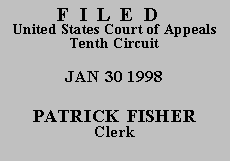

| UNITED STATES OF AMERICA,
Plaintiff-Appellee, v. JAMES BARNES, |
|
Defendant James Barnes appeals the order of the district court denying his motion to vacate, set aside, or correct his sentence under 28 U.S.C. § 2255. He contends he received ineffective assistance of counsel in his trial for conspiracy to manufacture, possess, and distribute methamphetamine. We affirm.(1)
On appeal, Barnes contends counsel was ineffective because "counsel did not plan a defense, plan an attack, did not do any discovery, failed totally with hearsay evidence, did not make objections when necessary, and thereby totally failed to give James Barnes proper defense in a court of law."
Barnes did not raise the issue of ineffective assistance of trial counsel in his § 2255 proceedings before the district court. He contended he received ineffective assistance of counsel at sentencing. He argued before the district court that both trial and appellate counsel were ineffective in failing to object to the sentencing's court's application of the offense level for D-methamphetamine rather than L-methamphetamine. In the absence of extraordinary circumstances, this court will not review issues raised for the first time on appeal. Smith v. Secretary of New Mexico Dept. of Corrections, 50 F.3d 801, 814 n.22 (10th Cir. 1995). There are no extraordinary circumstances here to justify departure from the general rule. Moreover, the record does not include the trial transcript and other portions of the trial record. We cannot address issues when the record is insufficient for meaningful review. See Strand v. United States, 780 F.2d 1497, 1500 (10th Cir. 1985).
Barnes is granted a certificate of probable cause. The district court's denial of Barnes' § 2255 motion is AFFIRMED. The mandate shall issue forthwith.
Entered for the Court
Mary Beck Briscoe
Circuit Judge
*. This order and judgment is not binding precedent, except under the doctrines of law of the case, res judicata, and collateral estoppel. The court generally disfavors the citation of orders and judgments; nevertheless, an order and judgment may be cited under the terms and conditions of 10th Cir. R. 36.3.
1. Because Barnes filed his § 2255 motion on March 13, 1996, before the effective date of the Antiterrorism and Effective Death Penalty Act of 1996, he is not required to obtain a certificate of appealability. See United States v. Kunzman, 125 F.3d 1363, 1364 n.2 (10th Cir. 1997).